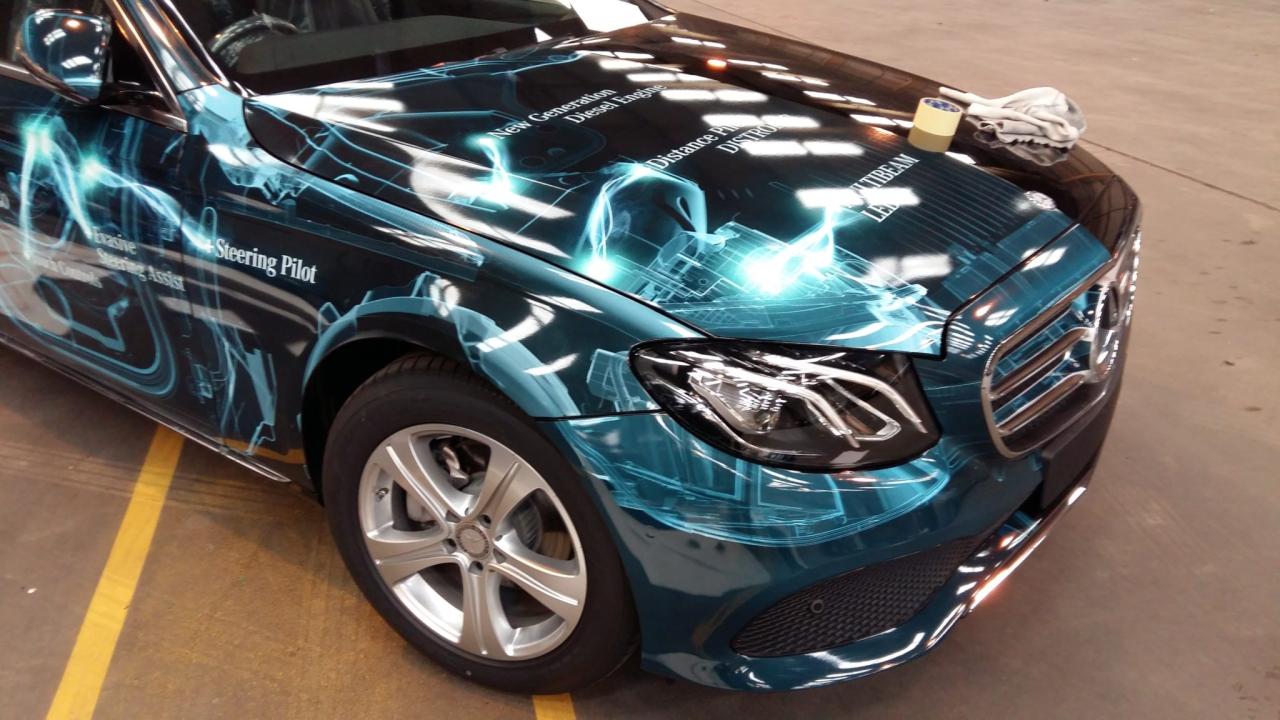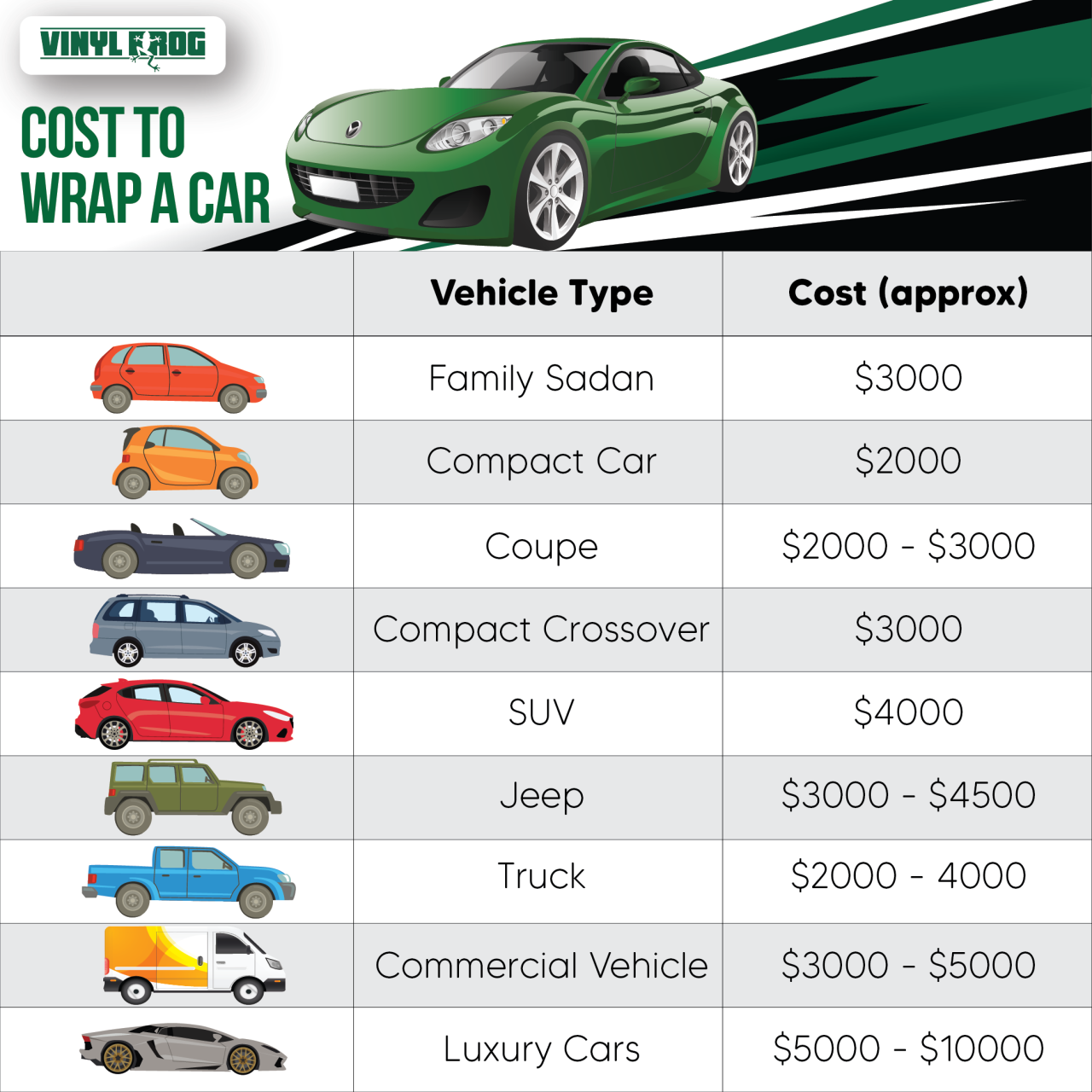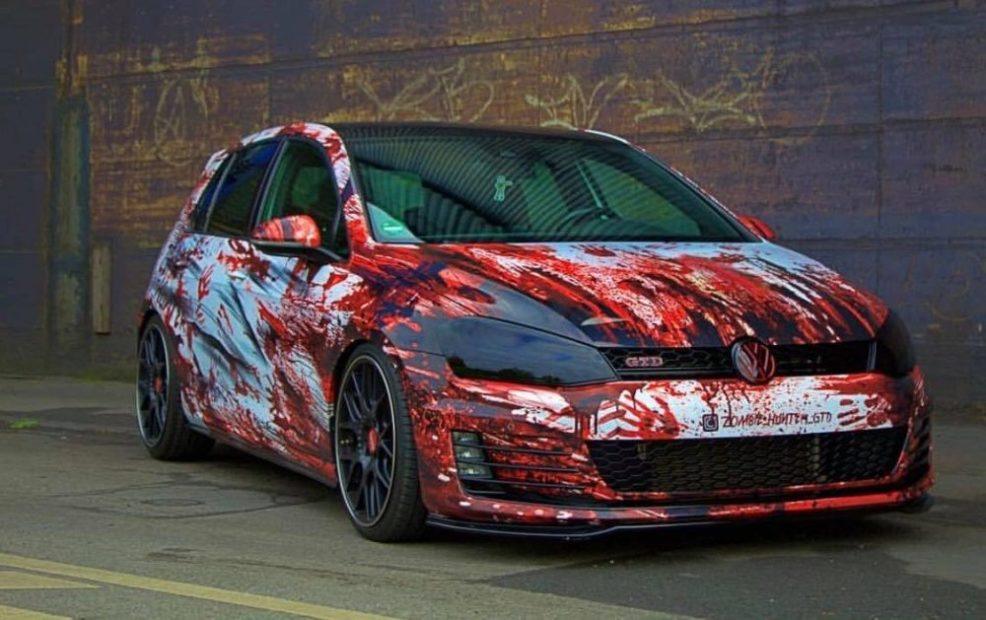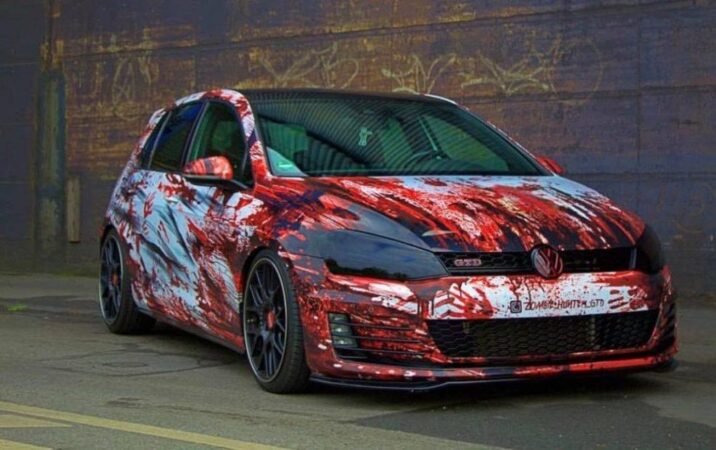
How much does car wrap cost? It’s a question that pops up in the minds of many car enthusiasts considering this unique way to customize their rides. From sleek matte finishes to vibrant custom designs, car wraps offer a versatile and eye-catching alternative to traditional paint jobs. But the cost can vary greatly depending on factors like the vehicle’s size, the chosen material, and the complexity of the design. Let’s delve into the world of car wraps and uncover the key factors that influence their price.
The cost of a car wrap is influenced by several factors, including the size and complexity of the vehicle, the type of material used, and the design’s intricacy. Larger vehicles like SUVs and trucks require more material and labor, resulting in higher costs. Premium materials like 3M 1080 or Avery Dennison Supreme Wrapping Film often come with a higher price tag compared to basic vinyl wraps. Custom designs involving intricate graphics, logos, and multiple colors also contribute to increased expenses.
Factors Affecting Car Wrap Cost

The price of a car wrap can vary significantly depending on several factors. Understanding these factors can help you make an informed decision and budget accordingly.
Vehicle Size and Complexity
The size and complexity of your vehicle play a significant role in determining the cost of a car wrap. Larger vehicles, such as SUVs or trucks, require more material and labor, leading to higher costs. Similarly, vehicles with intricate designs or numerous curves and edges may be more challenging to wrap, increasing the labor time and cost.
Car Wrap Material Types
Different types of car wrap materials are available, each with its own price point and characteristics.
- Vinyl Wraps: Vinyl wraps are the most common type of car wrap material. They are available in a wide range of colors, finishes, and textures, offering a variety of options to suit different tastes and budgets. Vinyl wraps are typically priced based on the quality and thickness of the material. For example, a basic vinyl wrap may cost around $2-$4 per square foot, while a premium vinyl wrap with a unique finish or texture could cost $5-$8 per square foot or more.
- PPF (Paint Protection Film): PPF is a transparent, self-healing film that protects your car’s paint from scratches, chips, and other damage. PPF is often more expensive than vinyl wraps but provides superior protection. The cost of PPF can vary depending on the thickness and quality of the film, as well as the size and complexity of the vehicle.
- Carbon Fiber Wraps: Carbon fiber wraps offer a sleek and sporty look and are known for their durability. They are typically more expensive than vinyl wraps due to the cost of the material and the specialized installation process.
Average Cost Range for Car Wraps
The average cost of a car wrap can vary depending on the factors mentioned above. However, here is a general cost range:
- Basic Car Wrap: A basic car wrap, using standard vinyl material, can cost between $1,500 and $3,000 for a small car, and between $2,500 and $5,000 for a larger vehicle.
- Premium Car Wrap: A premium car wrap, using high-quality vinyl material with unique finishes or textures, can cost between $3,000 and $7,000 for a small car, and between $4,000 and $10,000 for a larger vehicle.
Full Car Wrap vs. Partial Wrap
The cost of a car wrap also depends on whether you are wrapping the entire vehicle or just a portion of it. A full car wrap covers the entire exterior of the vehicle, including the hood, roof, doors, and trunk. A partial wrap covers only a specific area, such as the hood, roof, or doors.
- Full Car Wrap: A full car wrap typically costs more than a partial wrap because it requires more material and labor.
- Partial Car Wrap: A partial car wrap is a more affordable option if you are looking to add a touch of customization without the expense of a full wrap.
Car Wrap Installation Cost: How Much Does Car Wrap Cost
The cost of installing a car wrap is a significant factor in the overall expense of customizing your vehicle. This cost is determined by various factors, including the size and complexity of the vehicle, the type of wrap material used, and the experience and expertise of the installer.
Car Wrap Installation Process
The installation process for a car wrap is intricate and involves multiple steps to ensure a high-quality and durable finish.
- Vehicle Preparation: This initial stage involves a thorough cleaning of the vehicle to remove dirt, debris, and contaminants that could hinder the adhesion of the wrap. This includes washing, drying, and decontaminating the surface.
- Surface Preparation: Once the vehicle is clean, the installer prepares the surface by sanding and smoothing any imperfections or irregularities. This ensures a smooth and even application of the wrap.
- Cutting and Applying the Wrap: The wrap material is carefully measured and cut to fit the contours of the vehicle. The installer then applies the wrap to the vehicle, using specialized tools and techniques to ensure proper alignment and adhesion.
- Smoothing and Finishing: After the wrap is applied, the installer uses a squeegee to smooth out any air bubbles or wrinkles, ensuring a seamless finish.
- Inspection and Final Touches: The installer inspects the wrap for any imperfections and makes any necessary adjustments. They may also apply a sealant or protective coating to enhance the durability and longevity of the wrap.
Hourly Rate for Professional Car Wrap Installers
The hourly rate for professional car wrap installers can vary depending on their experience, location, and reputation.
On average, you can expect to pay between $50 and $100 per hour for a skilled car wrap installer.
Cost of Labor Based on Vehicle Size and Complexity
The cost of labor for car wrap installation is directly influenced by the size and complexity of the vehicle. Larger vehicles, such as SUVs and trucks, require more time and effort to wrap, leading to higher labor costs.
- Compact Cars: Expect to pay between $500 and $1,000 for labor costs.
- Sedans: The labor cost for sedans typically falls between $700 and $1,500.
- SUVs and Trucks: Due to their larger size and intricate designs, SUVs and trucks can cost $1,000 to $2,500 or more for labor.
Additional Costs Associated with Installation
Beyond the basic labor costs, there are several additional expenses that can contribute to the overall cost of car wrap installation.
- Prep Work: The cost of preparing the vehicle for wrapping, such as removing existing badges, emblems, and trim pieces, can range from $50 to $200.
- Removal of Existing Wraps: If you are replacing an existing wrap, the removal process can cost $100 to $300 depending on the size and complexity of the wrap.
- Specialty Wraps: Some car wraps, such as those with intricate designs or multiple colors, may require additional time and effort, leading to higher installation costs.
Finding Reputable Car Wrap Installers
Finding a reputable car wrap installer is crucial to ensure a high-quality and long-lasting wrap.
- Online Reviews and Testimonials: Look for installers with positive reviews and testimonials from previous clients.
- Portfolio and Previous Work: Request to see a portfolio of the installer’s previous work to assess their skills and experience.
- Word-of-Mouth Recommendations: Ask friends, family, or other car enthusiasts for recommendations on trusted car wrap installers in your area.
- Industry Associations: Consider contacting local or national car wrap associations for referrals to certified installers.
Car Wrap Maintenance and Durability
A car wrap is an investment, and its longevity and maintenance costs play a crucial role in determining its overall value. Understanding the expected lifespan, maintenance requirements, and durability of different materials can help you make informed decisions about your car wrap.
Expected Lifespan of a Car Wrap, How much does car wrap cost
The lifespan of a car wrap can vary depending on factors such as the quality of the material, the application process, and environmental conditions. A high-quality wrap, properly installed and maintained, can last anywhere from 3 to 5 years. However, factors like exposure to extreme weather, frequent washing, and abrasive cleaning agents can shorten its lifespan.
Alternatives to Car Wraps

Car wraps are a popular way to customize your vehicle’s appearance, but they’re not the only option. Several alternatives offer unique benefits and drawbacks, making it essential to weigh your options carefully. This section will delve into the cost, durability, and aesthetics of paint jobs and vinyl decals, helping you make an informed decision.
Cost Comparison of Vehicle Customization Methods
When comparing the cost-effectiveness of car wraps, paint jobs, and vinyl decals, it’s crucial to consider the overall investment and long-term value.
- Car Wraps: Car wraps typically cost between $2,000 and $5,000, depending on the size and complexity of the design. The cost can vary based on factors such as the type of vinyl used, the number of colors, and the experience of the installer.
- Paint Jobs: Paint jobs can range from $1,000 to $10,000 or more, depending on the scope of the work. A simple color change might cost less, while a custom paint job with intricate designs or special effects can be significantly more expensive.
- Vinyl Decals: Vinyl decals are the most affordable option, typically costing between $50 and $500 depending on size and complexity. Decals can be a good option for adding small accents or logos to your vehicle.
Durability and Aesthetics of Different Customization Methods
The durability and aesthetics of each customization method are crucial factors to consider.
- Car Wraps: Car wraps are highly durable and can last for several years with proper care. They offer a wide range of colors, finishes, and designs, allowing for greater creative freedom. However, car wraps can be susceptible to scratches and damage, especially in areas prone to abrasion.
- Paint Jobs: Paint jobs offer a more permanent solution and can last for many years with proper maintenance. They provide a smooth, high-quality finish and can be customized with various colors, effects, and designs. However, paint jobs can be expensive to repair if damaged, and the color may fade over time.
- Vinyl Decals: Vinyl decals are a more affordable and removable option. They offer a wide range of designs and can be easily applied and removed without damaging the paint. However, decals are less durable than car wraps or paint jobs and can be prone to peeling or fading over time.
Conclusion

Car wraps offer a dynamic and cost-effective way to personalize your vehicle, providing a unique blend of aesthetics and protection. By understanding the key factors that influence the price, you can make an informed decision and find a car wrap solution that fits your budget and preferences. From choosing the right material to selecting a reputable installer, a well-planned approach ensures a successful and visually stunning car wrap experience.
General Inquiries
What is the average cost of a full car wrap?
The average cost of a full car wrap can range from $2,000 to $5,000 or more, depending on the factors mentioned above.
Can I install a car wrap myself?
While DIY car wrap installation is possible, it’s highly recommended to hire a professional for a flawless finish and to avoid potential damage to your vehicle.
How long does a car wrap last?
With proper care, a high-quality car wrap can last anywhere from 3 to 5 years, sometimes even longer.
Is a car wrap worth the cost?
The cost-effectiveness of a car wrap depends on your individual needs and preferences. It can be a more affordable alternative to a paint job, while offering a greater degree of customization.





